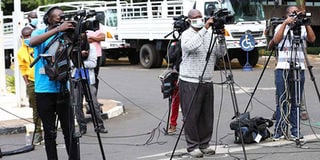Journalism hit hard by the virus and we are all the poorer for it

Journalists covering the coronavirus daily briefing at Afya House in Nairobi on April 19, 2020. PHOTO | SILA KIPLAGAT | NATION MEDIA GROUP
What you need to know:
- Media companies’ advertising and sales revenues have dropped rapidly, forcing them to resort to cost-cutting, including reducing salaries for journalists.
- It has been rightly observed that the more the authorities try to restrict journalists from reporting on the coronavirus, the more it spreads.
Journalists are on the frontline reporting the Covid-19 pandemic, the biggest story of our lifetime.
While we all feel overwhelmed by this extraordinary coronavirus outbreak, journalists are particularly hit hard.
They cannot self-isolate or quarantine themselves because they have a duty to go out there and get the basic facts and information that we need to understand and deal with the pandemic. In the process, they expose themselves to health risks and physical danger.
Journalists have also taken a hit in their pockets. Media companies have resorted to salary cuts and layoffs. A third blow is the threat to press freedom as governments seek to control the flow of information on the pandemic.
Therefore, as a professional group, journalists are the most exposed to the risks and threats posed by the pandemic. And we are all the poorer for it, given the role of journalists in keeping us informed.
Journalists have been infected by the coronavirus in the course of their work and some have even died. For example, in Russia, about 100 journalists have been infected and one has died, TASS, the Russian News Agency, reported on April 2. In India, at least 53 journalists have tested positive for Covid-19 in Mumbai alone.
FINANCIAL BLOW
So far, no Nation Media Group journalist is known to have contracted the virus; the news anchor Dan Mwangi Covid-19 scare story, broadcast on April 19, was just that.
Kisumu’s Urban Radio presenter Myra Anubi has, however, tested positive, the Sunday Nation reported on March 22.
But it is the economic impact of the pandemic that has had the most negative impact on journalism. Media companies’ advertising and sales revenues have dropped rapidly, forcing them to resort to cost-cutting, including reducing salaries for journalists.
In Kenya, journalists have been subjected to compulsory pay cuts of up to 30 per cent.
Another major blow has been restrictions on press freedom. In many parts of the world, journalists cannot freely report on the pandemic without fear of reprisals.
Here at home, NTV cameraman Peter Wainaina was clobbered by police as he struggled to record the mayhem that attended the first enforcement of the newly imposed curfew at the Likoni ferry crossing in Mombasa last month.
“I was actually doing my work and the brutality of the policeman caught me by surprise. I did not provoke him, and it was uncalled for,” Mr Wainaina said.
PRESS FREEDOM
A Weru TV cameraman, Gregory Murithi, was also attacked by police as he recorded an operation to enforce social distancing at Mitunguu market in Imenti South, Meru County.
Also this month, two journalists in Nakuru were summoned by the Directorate of Criminal Investigations (DCI) over a story concerning quarantine at Lanet barracks.
DCI officer Michael Mwenze said they were required to record a statement and reveal their sources.
Authorities have been even more draconian in their treatment of journalists covering the pandemic. For example, in neighbouring Tanzania, the government barred Talib Ussi Hamad, of the Daima daily newspaper, from working as a journalist for six months because of the way he reported the pandemic.
CENSORSHIP
The Mwananchi daily newspaper also had its licence suspended after it posted a photo in which President John Pombe Magufuli is shown shopping while surrounded by a crowd, eliciting online discussion on social distancing to avoid the virus.
It has been rightly observed that the more the authorities try to restrict journalists from reporting on the coronavirus, the more it spreads.
It has also been said that had the Chinese media been free, Covid-19 might not have become a pandemic.
The media, as society’s watchdog, plays a critical role in informing the public about issues such as the coronavirus. Authorities should not restrict the freedom of journalists to do their work as this hurts us all.
Send your complaints to [email protected]. Call or text 0721 989 264





